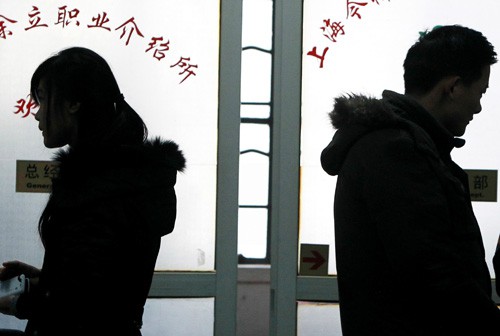|
 |
|
DREAMING OF A NEW LIFE: Young people from the countryside look for job opportunities at an employment agency in Shanghai (XINHUA) |
In the decades since the great rural-to-urban migration began in the 1980s, the children of the first migrants frequently choose to remain in the cities where they were born and raised. They have no desire to return to their parents' hometowns or to follow in the footsteps of their grandparents and become farmers. Never having been taught how, these "second-generation migrant workers" are instead desperate to integrate into city life.
In many cases, "migrant worker" may not even be an accurate title for them, as many have settled in the cities where they work with their spouses and children. Even without a hukou, or permanent residence registration, that would allow them to receive the same benefits as city residents, they still prefer city life over rural life. However, the increase in these new young urbanites will put a strain on China's food supply, as well as possibly threatening its social stability.
Statistics have shown that people in cities consume more food than people in rural areas. With the government's push toward urbanization, food demand will likely continue to climb. To meet this demand, however, China needs knowledgeable farmers who are capable of employing modern agricultural methods. Unfortunately, most farmers today are older men and women, while the younger generation of would-be farmers have left the countryside in search of more profitable work.
Even though the Chinese Government recently announced that crop production has increased over the past 10 years, Chinese leaders still see food security as a major issue, with the recent Central Economic Work Conference giving it top priority for 2014. Given the decrease in arable land and increase in reliance on food imports, many Chinese are understandably worried about food security.
Meanwhile, the presence of second-generation migrant workers in cities may disrupt social stability if they are not properly integrated. However, it remains difficult for them to obtain an urban hukou, which prevents them from sending their children to a good local school without paying an exorbitant amount in tuition. They often cannot afford an apartment in some big cities and instead live in shantytowns. Though they try to fit in, they remain systematically marginalized.
These second-generation migrant workers, who don't know anything about farming, should at least receive better job opportunities in the cities they've made their homes. But this begs the question: Who will produce our food?
Under such circumstances, China needs to adopt substantial incentives for rural and agricultural development, encouraging young people to contribute to rural development and agricultural production.
The author is a PhD student at the Rural Development Institute of the Chinese Academy of Social Sciences
Email us at: zanjifang@bjreview.com | 